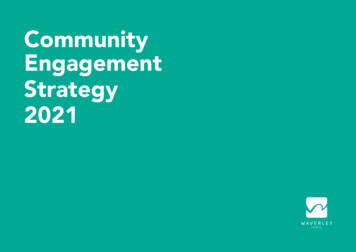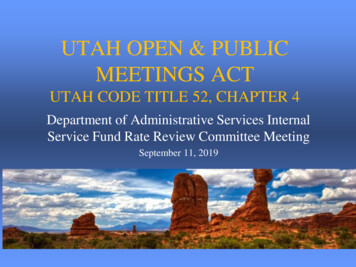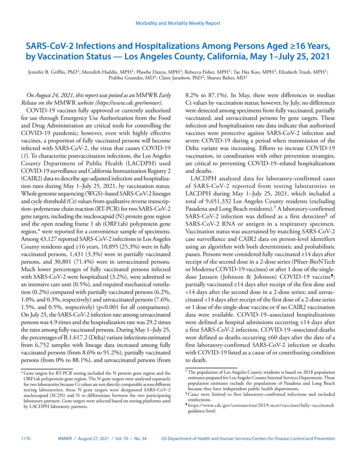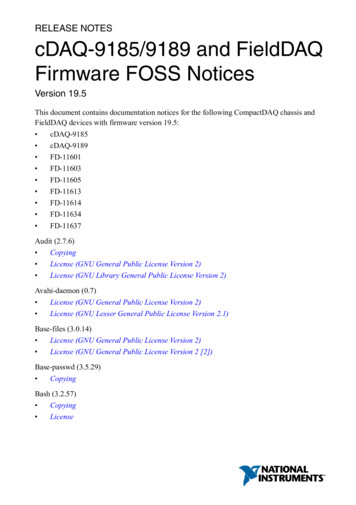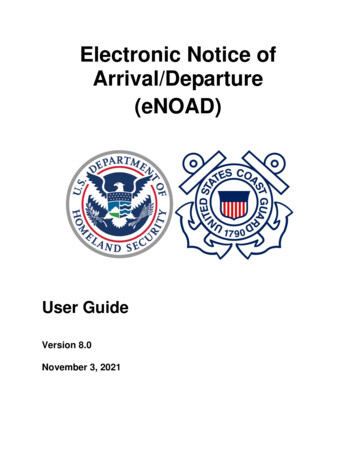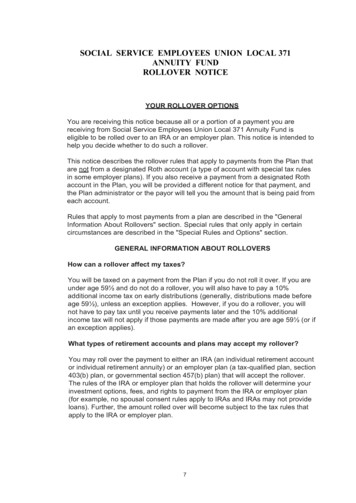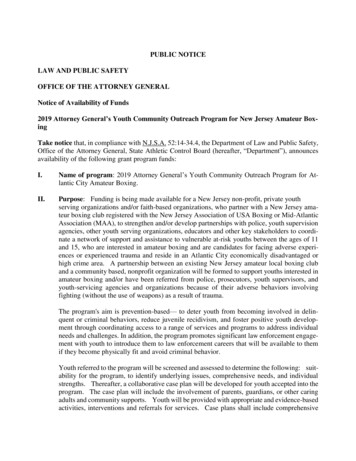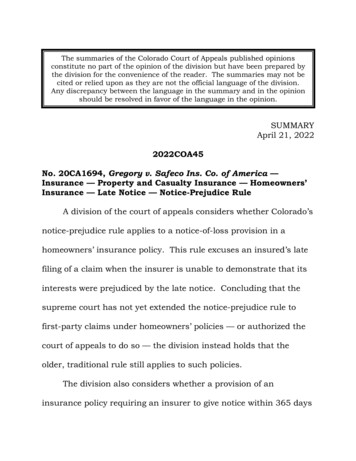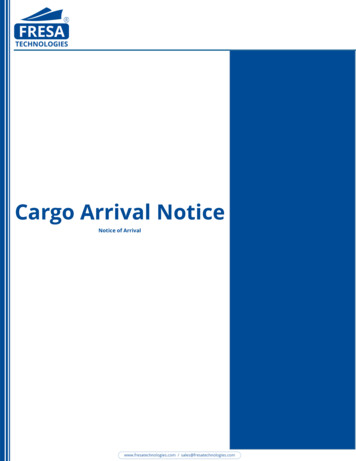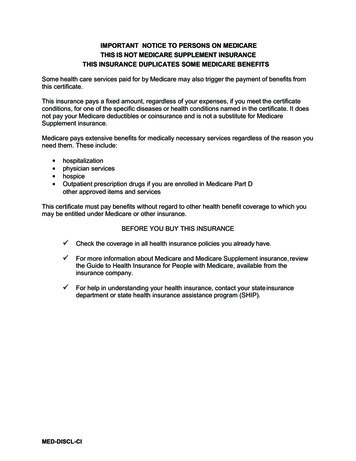
Transcription
IMPORTANT NOTICE TO PERSONS ON MEDICARETHIS IS NOT MEDICARE SUPPLEMENT INSURANCETHIS INSURANCE DUPLICATES SOME MEDICARE BENEFITSSome health care services paid for by Medicare may also trigger the payment of benefits fromthis certificate.This insurance pays a fixed amount, regardless of your expenses, if you meet the certificateconditions, for one of the specific diseases or health conditions named in the certificate. It doesnot pay your Medicare deductibles or coinsurance and is not a substitute for MedicareSupplement insurance.Medicare pays extensive benefits for medically necessary services regardless of the reason youneed them. These include:hospitalizationphysician serviceshospiceOutpatient prescription drugs if you are enrolled in Medicare Part Dother approved items and servicesThis certificate must pay benefits without regard to other health benefit coverage to which youmay be entitled under Medicare or other insurance.BEFORE YOU BUY THIS INSURANCE Check the coverage in all health insurance policies you already have. For more information about Medicare and Medicare Supplement insurance, reviewthe Guide to Health Insurance for People with Medicare, available from theinsurance company. For help in understanding your health insurance, contact your state insurancedepartment or state health insurance assistance program (SHIP).MED-DISCL-CI
A Shopper’s Guide
About the NAIC The National Association of Insurance Commissioners (NAIC) is the oldestassociation of state government officials. Its members consist of the chief insuranceregulators in all 50 states, the District of Columbia and five U.S. territories. The primaryresponsibility of state insurance regulators is to protect the interests of insuranceconsumers, and the NAIC helps regulators fulfill that obligation in a number of differentways. This guide is one example of work done by the NAIC to assist states in educatingand protecting consumers.Another way the NAIC lends support to state regulators is by providing a forum forthe development of uniform public policy when uniformity is appropriate. It does thisthrough a series of model laws, regulations and guidelines, developed for the states’ use.States that choose to do so may adopt the models intact or modify them to meet theneeds of their marketplace and consumers.The NAIC’s mission is to assist state insurance regulators, individually andcollectively, in serving the public interest and achieving the following fundamentalinsurance regulatory goals in a responsive, efficient and cost effective manner,consistent with the wishes of its members: Protect the public interest; Promote competitive markets; Facilitate the fair and equitable treatment of insurance consumers; Promote the reliability, solvency and financial solidity of insuranceinstitutions; and Support and improve state regulation of insurance.National Association of Insurance Commissioners2301 McGee StreetSuite 800Kansas City, MO 64108-2604816-842-3600Fax 816-783-8175www.naic.org
A Shopper’s Guide toCANCER INSURANCENational Association of Insurance Commissioners
2004, 2006 National Association of Insurance CommissionersAll rights reserved.National Association of Insurance CommissionersInsurance Products & Services Division816-783-8300Fax 816-460-7593www.naic.org/store home.htmprodserv@naic.orgPrinted in the United States of AmericaNo part of this book may be reproduced, stored in a retrieval system, or transmitted in any form or by any means,electronic or mechanical, including photocopying, recording, or any storage or retrieval system, without writtenpermission from the NAIC.Executive Headquarters2301 McGee Street, Suite 800Kansas City, MO 64108-2662816-842-3600Securities Valuation Office48 Wall Street, 6th FloorNew York, NY 10005-2906212-398-9000Government RelationsHall of States Bldg.444 North Capitol NW, Suite 701Washington, DC 20001-1509202-624-7790
A Shopper’s Guide to Cancer InsuranceTable of ContentsIntroduction . . . . . . . . . . . . . . . . . . . . . . . . . . . . . . . . . . . . . . . . . . . . . . . . . . .1Cancer Insurance is Not a Substitutefor Comprehensive Coverage . . . . . . . . . . . . . . . . . . . . . . . . . . . . . . . . . . . .1Should You Buy Cancer Insurance?Many People Do Not Need It . . . . . . . . . . . . . . . . . . . . . . . . . . . . . . . . . . . . .1Caution: Limitations of Cancer Insurance . . . . . . . . . . . . . . . . . . . . . . . . . . 2 2004, 2006 National Association of Insurance Commissioners
A Shopper’s Guide to Cancer InsuranceIntroductionCancer insurance provides benefits only if you get cancer. No policy will coveryou for cancer diagnosed before you applied for the policy. Examples of otherspecified-disease policies are heart attack or stroke policies. The information in thisbooklet applies to cancer insurance, but could very well apply to other specifieddisease policies.Cancer treatment accounts for about 10 percent of all U.S. health expenses. In fact,no single disease accounts for more than a small proportion of the American public’shealth care bill. This is why it is essential to have insurance coverage for all conditions,not just cancer.If you and your family are not protected against catastrophic medical costs, youshould consider a major medical policy. These policies pay a large percentage of yourcovered costs after a deductible is paid, either by you or your basic insurance. Theyoften have very high maximums, such as 100,000 to 1 million. Major medical policieswill cover any accident or sickness, including cancer. They cost more than cancerpolicies because they cover more, but they are generally considered a better buy.Should You Buy Cancer Insurance?Many People Do Not Need itIf you are considering cancer insurance, ask yourself three questions: Is my current coverage adequate for these costs? How much will treatment cost if I do get cancer? How likely am I to contract the disease?IntroductionCancer Insurance is Not a Substitutefor Comprehensive CoverageIf you have Medicare and want more insurance, a comprehensive Medicaresupplement policy is what you need. Low-income people who are Medicaid recipientsdo not need any more insurance. If you think you might qualify, contact your local socialservice agency. Duplicate Coverage is Expensive and Unnecessary.Buy basic coverage first, such as a major medical policy. Make sure any cancerpolicy will meet any needs not met by your basic insurance. You cannot assumethat double coverage will result in double benefits. Many cancer policiesadvertise that they will pay benefits no matter what your other insurance pays.However, your basic policy might contain a coordination of benefits clause. Thatmeans it will not pay duplicate benefits. To find out if you can get benefits fromboth policies, check your major medical insurance, as well as the cancer policy. 2004, 2006 National Association of Insurance Commissioners1
Limitations of Cancer InsuranceA Shopper’s Guide to Cancer Insurance2 Some Cancer Expenses Might Not be Covered, Even by a Cancer Policy.Medical costs of cancer treatment vary. On average, hospitalization accounts for78 percent of such costs and physician services account for about 13 percent.The remainder goes for other professional services, drugs and nursing homecare. Cancer patients often face large, non-medical expenses that are not usuallycovered by cancer insurance. Examples include home care, transportation andrehabilitation costs. Do Not be Misled by Emotions.While three in 10 Americans will get cancer over a lifetime, seven in 10 will not.In any one year, only one American in 250 will get cancer. The odds are againstyou receiving any benefits from a cancer policy. Be sure you know whatconditions must be met before the policy will start to pay your bills.Caution: Limitations of Cancer InsuranceCancer policies sold today vary widely in cost and coverage. If you decide topurchase a cancer policy, contact different companies and agents, and compare thepolicies before you buy. The following are some common limitations: Some policies pay only for hospital care.Today cancer treatment, including radiation, chemotherapy and some surgery, isoften given on an outpatient basis. Because the average stay in the hospital for acancer patient is only 13 days, a policy that pays only when you are hospitalizedhas limited value. Many policies promise to increase benefits after a patient has been in thehospital for 90 consecutive days.However, because the average stay in a hospital for a cancer patient is 13 days,large dollar amounts for extended benefits have very little value formost patients. Many cancer insurance policies have fixed dollar limits.For example, a policy might pay only up to 1,500 for surgery costs or 1,000for radiation therapy, or it might have fixed payments, such as 50 or 100 foreach day in the hospital. Others limit total benefits to a fixed amount, such as 5,000 or 10,000. No policy will cover cancer diagnosed before you applied for the policy.Some policies will deny coverage if you are later found to have had cancer at thetime of purchase, even if you did not know it. Most cancer insurance does not cover cancer-related illnesses.Cancer or its treatment might lead to other physical problems, such as infection,diabetes or pneumonia. Many policies contain time limits.Some policies require waiting periods of 30 days or even several monthsbefore you are covered. Others stop paying benefits after a fixed period of two orthree years. 2004, 2006 National Association of Insurance Commissioners
7/9/07
For more information about Medicare and Medicare Supplement insurance,review the Guide to Health Insurance for People with Medicare, available from the insurance company. For help in understanding your health insurance, contact your stateinsurance department or state health insurance assistance program (SHIP). MED-DISCL-CI
